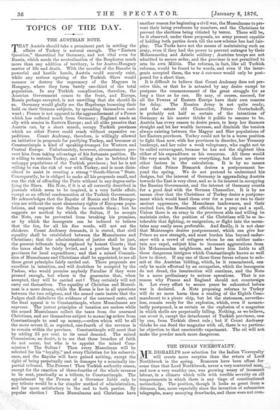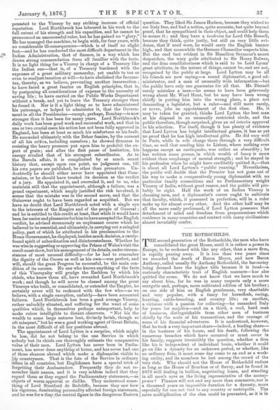THE INDIAN VICEROYALTY.
MD ISRAELI'S new selection for the Indian Viceroyalty- will create more surprise than the return of Lord Northbrook in the spring. Rumours have been afloat for some time that Lord Northbrook, never a very contented man, , , and now a very wealthy one, was growing weary of incessant labour, in a climate which tells with terrible severity on all temperaments in which there is any tinge of constitutional melancholy. The position, though it looks so great from at distance, has, more especially since the invention of submarine telegraphs, many annoying drawbacks, and these were not coin,
pensated to the Viceroy by any striking increase of official reputation. Lord Northbrook has laboured in his work to the full extent of his strength and his capacities, and he cannot be pronounced an unsuccessful ruler, but he has gained no "glory." He has managed the machine, to begin with, for four years, with no considerable ill-consequences—which is of itself no slight
feat—and he has conducted the most difficult department in the 174* Indian Administration, that of finance, in a way which has drawn strong commendation from all familiar with the facts.
It is no light thing for a Viceroy in charge of a Treasury like the Indian one—that is, of a Treasury burdened with the expenses of a great military monarchy, yet unable to tax or even to readjust taxation at will—to have abolished the Income- tax, thereby, as we believe, preventing another insurrection ; to have faced a great famine on English principles, that is, by postponing all considerations of expense to the necessity of saving life ; to have carried on the Public Works Department without a break, and yet to leave the Treasury stronger than he found it. Nor is it a light thing so to have administered his patronage, or helped to administer it, that the Govern- ment in all the Presidencies—except, perhaps, Bombay—is now stronger than it has been for many years. Lord Northbrook's daily work has been good work and successful work, and that in one or two crucial cases his action has not been fully approved in England, has been at least as much his misfortune as his fault. He succeeded ultimately with the Behar famine, by the consent of all his critics, including ourselves ; he showed firmness in resisting the heavy pressure put upon him to prohibit the ex- port of grain; and after the first pause of hesitation, his energy rivalled that of his strongest subordinates. As to the Baroda affair, it is complicated by so much secret history that, except upon one point, no judgment can, till his own papers are published, be other than premature. Un- doubtedly he should either never have appointed that Com- mission, or he should have treated its decision as the verdict of a jury. He appointed it, and overruled it, and to us, who maintain still that the appointment, although a failure, was a grand experiment, which amply justified the risk involved, it seems that the mistake was in the second move, and that the Guicowar ought to have been regarded as acquitted. But we have no doubt that Lord Northbrook acted with a single eye to the interests of the Empire and of the people of Guzerat ; and he is entitled to this credit at least, that while it would have been far easier and pleasanter for him to have accepted the English verdict, he advised strenuously an unpleasant course which he believed to be essential, and ultimately, in carrying out a mingled policy, part of which he attributed in his proclamation to the Home Government, he displayed, besides much decision, a rarely- found spirit of subordination and disinterestedness. Whether he was wise in suggesting or approving the Prince of Wales's visit the result must show, but his management of its details, under circum- stances of most unusual difficulty—for he had to remember the dignity of the Crown as well as his own—was perfect, and will, should the great Progress be successful, be the main con- dition of its success. No one who knows anything of the facts of this Viceroyalty will grudge the Earldom by which his chiefs, who know them all, have rewarded Lord Northbrook's work ; and though he will never be classed among the great Viceroys who built, or consolidated, or extended the Empire, he certainly never will be reckoned with the few who—as we believe, with a single exception, unfairly—have been accounted failures. Lord Northbrook has been a good average Viceroy, rather unluckily situated, and suffering for the want of some qualities which, in themselves perhaps unimportant, help to make rulers intelligible to distant observers. "Not his the wealth to some large natures lent, divinely lavish, though so oft misspent," but he was a good working agent of Great Britain, in the most difficult of all her positions abroad.
The appointment of Lord Lytton is a surprise, which might be less, did he not belong to the one Service in which nobody but its chiefs can thoroughly estimate the comparative value of their men. Lord Lytton has never been in Parlia- ment, has never done anything at home, and has never had one of those chances abroad which make a diplomatist visible to countrymen. That is the fate of the Service in ordinary 'Alms in all countries, but Englishmen have a special trick of forgetting their Ambassadors. Frequently they do not re- member their names, and it is very seldom indeed that they regard them as they regard the Parliamentary statesmen,—as objects of warm approval or dislike. They understood some- thing of Lord Stratford de Redcliffe, because they saw how his vigorous, dominating personality affected foreign statesmen, and he was for a tiny the central figure in the dangerous Eastern question. They liked Sir James Hudson, because they wished to see Italy free, and had a notion, quite accurate, but quite beyond proof, that he sympathised in their object, and could help them to secure it ; and they have a tendresse for Lord Odo Russell, because they think, quite justly, but still on very little evi- dence, that if need were, he would carry the English banner high, and that meanwhile the German Chancellor respects him. But the cool tact evident in Sir Hamilton Seymour's secret despatches, the wary guile attributed to Sir Henry Bulwer, and the firm conciliatoriness which is said to be Lord Lyons' great attribute, in the nature of things, cannot be, and are not, recognised by the public at large. Lord Lytton may be all his friends are now saying—a sound diplomatist, a good ad- ministrator, and a man of unusually wide information—but the public have only one guarantee for all that. Mr. Disraeli rarely mistakes a man—he seems to have been grievously wrong about Mr. Ward Hunt, but he may have been wrong chiefly in putting him into the wrong place, a place not demanding a legislator, but a ruler—and still more rarely, or never, jobs an appointment of the first class. He, it may be taken for granted, thinks Lord Lytton the best man at his disposal in an unusually restricted circle, and the public therefore, though surprised, gives an ad interim approval to his selection. For itself, though it has plenty of evidence that Lord Lytton has bright intellectual graces, it has as yet no proof that he has high intellectual gifts. He did very well in Paris, while in sole charge there through a very difficult time, so well that sending him to Lisbon, where nothing ever happens except an earthquake, was rather an absurdity ; he has written some poems, in which wealth of fancy is more evident than surplusage of mental strength ; and he stayed in his profession when he might have creditably quitted it,—that is about all Lord Lytton's "public running." Nevertheless, the public will decide that the Premier has not gone out of his way to make a comparatively young diplomatist with no particular family connections and no Parliamentary weight Viceroy of India, without good reason, and the public will pro- bably be right. Half the work of an Indian Viceroy is choosing men, and a diplomatist's career ought to cultivate that faculty, which, if possessed in perfection, will in a ruler make up for almost every other. And the other half may be all the more easily performed, if Lord Lytton possesses that detachment of mind and freedom from prepossessions which residence in many countries and contact with many civilisations almost invariably confer.



































 Previous page
Previous page